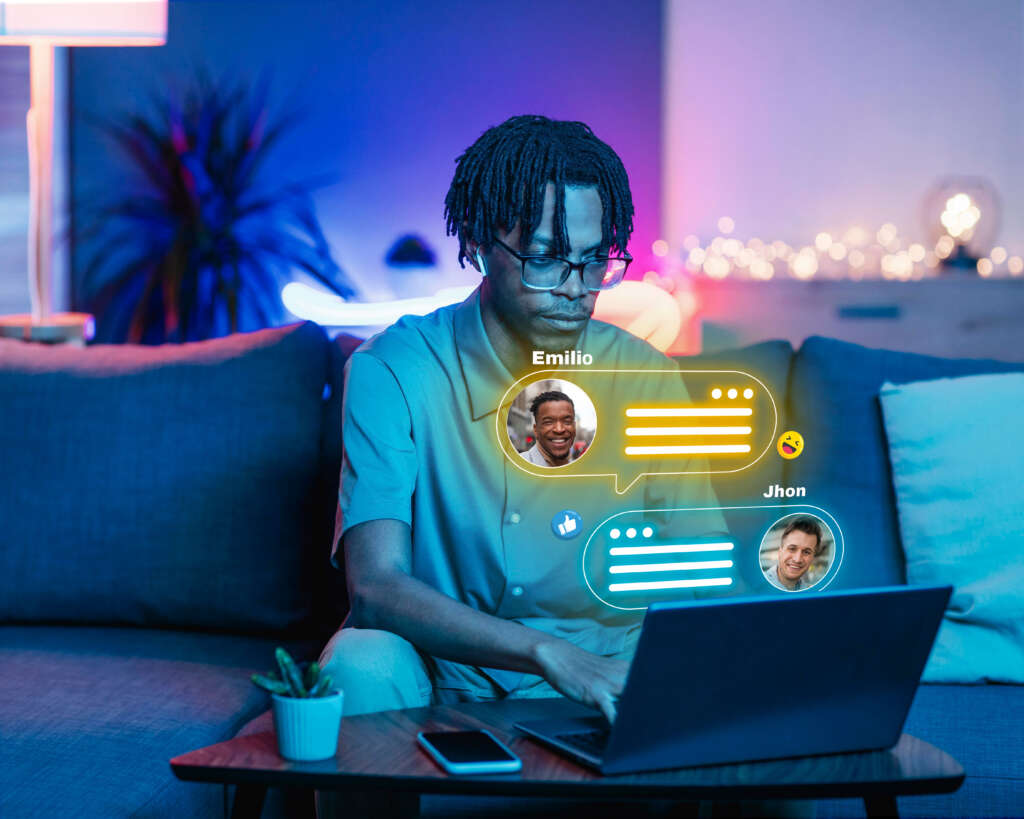AI has become a big part of Social Media Marketing today. It’s everywhere, making social networking sites work better. Think of that viral campaign that caught your eye – AI likely played a big role in it. For example, Heinz’s “Draw Ketchup” campaign used AI to get over 850 million views, breaking new ground in marketing.
Now, 63% of US B2B marketers say AI and social media help them a lot. People spend about 2 hours and 27 minutes daily on these platforms. Using AI in social media strategies is key. AI is not just about predicting trends or making content. It’s changing how we think about creativity and storytelling online.
AI uses big datasets to understand what people like, helping brands on platforms like Facebook, Instagram, LinkedIn, and Snapchat. This has cut down content creation time by 50% and saved money. Also, 54% of companies see AI as a way to make more money from social media.
In a crowded market, being different matters. AI helps figure out when to post for the best results, making every interaction count. But, there are worries about AI, like bias and the impact on jobs. This raises questions about the ethics of using AI in social media.
Top marketers are using AI to take their strategies to the next level. Tools like Lately and OpenAI’s ChatGPT are changing how we make content. But, there are ethical concerns about using AI. The future of AI in Social Media Marketing is exciting but also complex. It’s up to us to navigate it wisely, one click at a time.
The Revolutionary Impact of AI on Content Creation and Curation
Today, AI is changing how we interact with content on social media. It’s making content better and more engaging. AI tools are now a big part of social media, making creating content faster and more tailored to each user.
These tools look at huge amounts of data to understand what people like. They use this info to help plan content, like where to put ads and who to target them at.
ChatGPT and Grammarly are changing the game for text content. They use AI to write content that’s interesting and error-free. For visual content, tools like Canva and DALL-E are big helps. They make it easy to improve and create visuals that catch the eye.
Enhancing social media with AI is about making things simpler and more advanced. AI helps spot trends and how people react, letting creators fine-tune their plans. Tools like Salesforce Einstein and Adobe Sensei use predictive analytics to predict trends, helping shape new marketing strategies.
AI does more than just make content; it also makes it smarter. Algorithms suggest content that fits what users like and help brands tailor their feeds. AI can also pick up on feelings and opinions, making sure content hits the mark.
The era of generative AI in social media is about more than just making or sharing content. It’s about making it interactive and focused on the user. As AI gets better, social media marketing is on the verge of a big change. It promises a future where content is made and curated with great care and insight into what people want.
AI in Social Media Marketing: Analytics and Insights
The digital world is getting more complex, needing better tools for deeper insights and strategies in social media marketing. AI in social media analytics leads this change by helping businesses understand and connect with their audience better. It makes sense of huge data sets and gives clear insights, moving past simple likes and clicks to show how well content works and how engaged users are.

Today’s businesses use predictive analytics in social media to not just follow trends but also guess them. These platforms use machine learning to look at past data and current interactions to predict what customers will do next. This lets marketers plan, reaching customers with the right message at the best time, and making marketing efforts more efficient.
AI for social media optimization also helps by using NLP and image recognition to track brand mentions and feelings across different digital places and images. This means marketers can quickly adjust their plans to keep up with the fast-changing online world. AI in social media makes analyzing data easier and helps in making better decisions, leading to more successful marketing.
With these tools, companies can make smart choices about products, customer experiences, and how they stand out. By setting clear goals and picking the right topics and keywords, businesses can fully use social media insights. This leads to a deeper understanding of the market and what customers like driving smarter marketing strategies that meet business goals.
Strategizing with AI: A Look into AI-driven Social Media Strategies
The digital world today is a mix of tech and creativity. AI-driven social media strategy is key for brands worldwide. Facebook and Instagram use AI a lot, making old marketing ways less important.
Social media AI tools make brands talk better with their audience. AI helps make and schedule posts and changes content to fit what users like and what’s trending. This makes content more relevant and engaging, building a real connection with people.
AI also helps with talking to customers. AI chatbots on social sites offer customer service all the time, quickly answering questions. This makes customers happier and helps businesses work better.
Examples from the industry show how big an impact AI has on social media marketing. AI has helped campaigns get more engagement, reaching new highs in user interaction. This shows AI helps brands grow their online strategies well and saves money compared to old ways.
Using social media AI tools is not about replacing people with machines. It’s about adding AI’s power to human marketers’ creativity and insights. As AI gets better, brands that use it well will lead online, turning viewers into fans and browsers into loyal customers.
As the data suggests, businesses embracing AI are not just staying ahead of the curve—they are redrawing it altogether.
Using an AI-driven social media strategy is exciting for brands wanting to use both AI’s precision and human creativity. With these tools, marketers can make a stronger, more engaging online presence.
Enhancing User Engagement with AI Social Media Tools
In today’s digital world, AI social media engagement tools are key to making social media more engaging and personal. By using social media AI automation, brands can make content creation easier and connect better with their audience.

Generative AI for content creation gives brands an edge in a crowded social space. Tools like Brandwatch’s Iris use AI to create content that fits current trends and what people like, saving time on research. This leads to more efficient content creation and better user engagement.
Advanced machine learning also helps plan the best times to post, making sure content reaches people when they’re online. This smart automation shows how social media AI automation changes the game in social media, from analytics to customer service with AI chatbots.
For visuals, tools like Pixlr and Canva use AI to make eye-catching content. This is key for businesses to stay relevant and grab user attention. Tools like Grammarly and Hemingway Editor also make content easier to read and more real, which helps with social media engagement.
Using AI in social media boosts user interaction and helps brands have smarter, quicker marketing strategies. As AI gets better, its role in social media will keep improving, making connections and growing audiences across different platforms.
Cost-Effectiveness of Automating Social Media with AI
AI is changing social media marketing in big ways, especially by saving money. Companies are looking for ways to cut costs, and AI tools help a lot. They make tasks like making content and talking to customers easier, which saves time and money.
Marketing experts use AI to understand big data and find patterns. This helps them make better ads and use their money wisely. AI helps them reach more people and get better results, saving money in the long run.
Businesses are now using AI to manage their social media. AI makes content that feels personal to people, making them more engaged. Chatbots can talk to customers 24/7, improving satisfaction and saving time.
Using AI to manage social media is key to staying ahead online. By using predictive analytics and machine learning, companies can quickly adapt to trends. This makes their marketing more effective and efficient.
AI makes social media easier to handle and helps businesses grow. It’s great for small companies that want to reach more people without spending more money. With AI, they can grow their marketing efforts without spending more on ads.
AI’s Role in Influencer Marketing and Brand Partnerships

The world of influencer marketing has changed a lot thanks to artificial intelligence in brand partnerships. This change has made it easier for brands to find and work with influencers. The industry is growing fast, expected to hit $21.1 billion in 2023. AI is key in making marketing more efficient and strategic.
AI-driven influencer identification uses complex algorithms to find influencers that match a brand’s goals. It looks at who they reach and how they engage with them. This means finding influencers who are a good fit and can help a lot. For example, AI can spot influencers with high engagement rates, often beating human influencers.
AI influencers like Miquela are changing the game. They let brands control their messages perfectly. These virtual stars are key in delivering brand messages. They also save money, cutting costs by up to 30%, and freeing up funds for other marketing areas.
AI also helps with real-time analytics and predicting how people will react. This makes marketing smarter and more effective. It gives brands insights to plan better for the future. Plus, AI makes reporting easier, turning complex data into useful tips for marketing.
In short, AI in influencer marketing is playing a big role as the industry grows. It helps in finding influencers, managing virtual ones, and making quick, smart decisions. This ensures brands can leverage their partnerships well for big results.
Understanding AI in Social Media Analytics (Only to be used if the article requires an additional section)
AI-enhanced analytics have changed how we look at social media data. They give us deep insights into what users like and how they interact with content. Now, platforms like Twitter and Facebook use AI to show users content they’ll like best.
Twitter looks at about 500 million tweets every day. It uses info like where you are, what language you speak, and how you interact with others. This helps it show you tweets you might be interested in and suggest trends. Facebook does something similar, looking at post timing, who you are, and how people react to posts. This helps it show posts from friends and brands you follow first.
Thanks to these new tools, social media data analysis is more detailed. Marketers can now see exactly what gets people to engage with their content. Instagram’s boss, Adam Mosseri, says each part of Instagram, like the Feed and Stories, uses special algorithms. These algorithms make sure you see content that fits your interests.
Tools like Brand24 and new ones like TikTok and Twitch use AI to track trends and predict what’s next with AI social media trend prediction. They look at how often something is talked about and what people think of it. This helps brands understand how well their marketing is doing.
AI technology helps figure out which platforms get the most attention. This lets marketers adjust their plans quickly to keep up with changes in social media.
Using AI in social media makes big data useful for marketers. It helps them make campaigns that speak to people and get better engagement. As AI gets better, it will play an even bigger part in making marketing more personal and effective.
Challenges and Ethical Considerations in AI-Enhanced Social Media (Only to be used if the article requires an additional section)
AI has changed how we use social media, making digital marketing and communication different. The White House has put $140 million into AI tech, highlighting the need to tackle AI social media challenges and ethical issues. Agencies worry about AI biases that could lead to discrimination in important areas like jobs, money, and law.
There’s a push for explainable AI to make AI decisions clear and transparent. This is important for trust and fairness. But, China’s use of facial recognition for surveillance raises big privacy concerns. It could break human rights rules.
AI also brings up questions about jobs and the future of work. We need to talk about how to help workers adapt to new tech. The use of AI in things like self-driving cars raises big ethical questions. We need rules for AI to prevent misuse and ensure it’s used correctly.
Users often don’t understand the terms of service, making it hard to know what’s happening with our data. Even when we try to opt-out, it might not work, taking away our control over our data. Social media platforms are always at risk of being hacked, putting our info in danger.
AI can learn from biased data, making things worse for some groups. This shows how important it is to use diverse, fair data. We need clear rules and honest talk about AI and data to protect our democracy and economy.
In this complex AI world, being clear and strict about ethics is key. We must navigate this digital space responsibly.



